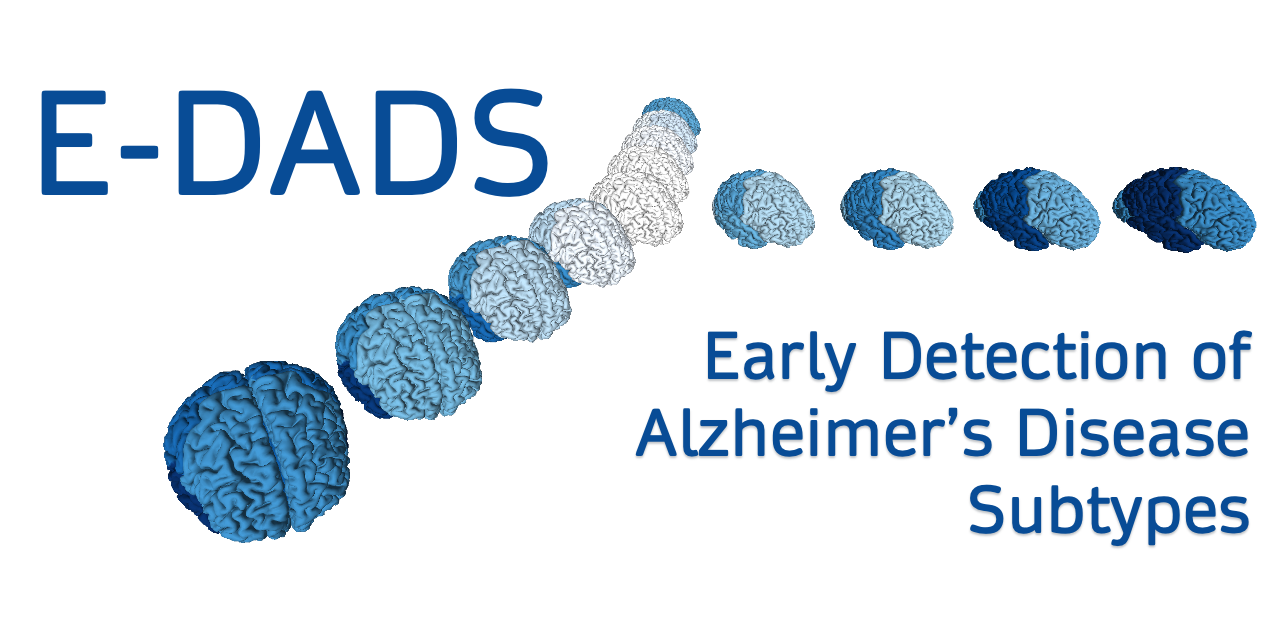E-DADS is an international research team bridging Computer Science and Neurology,
led by University College London.
Funding: EU Joint Programme --- Neurodegenerative Disease Research, 2020--2023
Summary
Alzheimer’s disease (AD) is a global health and economic burden with currently about 47 million affected individuals worldwide. No provably disease-modifying treatments exist (as of 2020). Delaying disease onset in dementia patients by five years can reduce care costs by 36% about 88B euro per year across the EU. A key confound preventing successful outcomes in most treatment trials to date has been AD’s high variation in onset, mechanism, and clinical expression.
E-DADS aims to untangle this heterogeneity by defining data-driven subtypes of the clinical manifestation of AD based on brain imaging, cognitive markers, and fluid biomarkers that are robustly identifiable from predictive risk factors (genetics, co-morbidities, physiological and lifestyle factors) years before disease onset.
To achieve this we develop a novel multi-view learning strategies that relates end-stage disease manifestations observable in clinical cohorts to features of early-stage or at-risk individuals in preclinical cohorts and the general pre-affected population from population or aging studies. This approach is only possible now due to the availability of large population data, richly phenotyped AD cohorts and advances in machine learning. E-DADS uniquely assembles the necessary data and expertise. The ability to identify AD subtypes and predict them years before onset will significantly advance AD research and clinical management via precision medicine. First, it identifies distinct homogeneous groups, shedding new light on that nature and variability of disease mechanisms ultimately pinpointing effective drug targets. Second, it enables enrichment of future clinical trials for specific groups of patients likely to benefit from a particular intervention. Third, it highlights potential lifestyle interventions that may affect or delay disease onset at very early stages.
E-DADS delivers the underpinning technology to achieve this through machine learning and big data analytics together with a prototype software tool enabling future translation and uptake.
Selected outputs
Journal articles
- Young & Oxtoby, et al., Nat. Rev. Neurosci. (2024). 10.1038/s41583-023-00779-6
Data-driven modelling of neurodegenerative disease progression: thinking outside the black box.
Readable for free at: https://rdcu.be/dvstu - Vakli, et al., Medical Image Analysis (2023). 10.1016/j.media.2023.102850
Automatic brain MRI motion artifact detection based on end-to-end deep learning is similarly effective as traditional machine learning trained on image quality metrics. - Chen et al., NeuroImage (2023). 10.1016/j.neuroimage.2023.120005
Transferability of Alzheimer’s disease progression subtypes to an independent population cohort. - Groot et al., NeuroImage: Clinical 30 (2021). 10.1016/j.nicl.2021.102660
Differential patterns of gray matter volumes and associated gene expression profiles in cognitively-defined Alzheimer’s disease subgroups. - Ingala, et al., European Radiology (2022). 10.1007/s00330-021-08503-7
Clinical applicability of quantitative atrophy measures on MRI in patients suspected of Alzheimer’s disease. - Redolfi, et al., European Journal of Neuroscience (2022). 10.1111/ejn.15854
Italian, European, And International Neuroinformatics Efforts: An Overview. - Davenport, et al., J. R. Soc. Interface (2023). 10.1098/rsif.2022.0406
Neurodegenerative disease of the brain: a survey of interdisciplinary approaches.
Conferences
- Poulet and Durrleman, IPMI (2021). hal.inria.fr/hal-03276811
Mixture modeling for identifying subtypes in disease course mapping. - Gruffaz et al., NeurIPS (2021). hal.inria.fr/hal-03485975
Learning Riemannian metric for disease progression modeling. - Sauty and Durrleman, MICCAI (2022). hal.inria.fr/hal-03701632
Progression models for imaging data with Longitudinal Variational Auto Encoders. - Sauty and Durrleman, ISBI (2022). hal.inria.fr/hal-03549061
Riemannian metric learning for progression modeling of longitudinal datasets.
E-DADS partners
- UCL, UK: University College London
- Danny Alexander, Andre Altmann, Neil Oxtoby
- VUmc, NL: Stichting VU University Medical Center
- Wiesje M van der Flier, Betty Tijms, Frederik Barkhof
- FBF, IT: IRCCS Fatebenefratelli Brescia
- Alberto Redolfi, Libera Cavaliere, Damiano Archetti
- ICM, FR: INRIA, Institut du Cerveau et de la Moelle épinière — Brain and Spine Institute
- Stanley Durrleman, Olivier Colliot
- CSIRO, AU: Commonwealth Scientific and Industrial Research Organisation
- Samantha Burnham, Victor Villemagne, Simon Laws, Stephanie Rainey-Smith
Widening partner
- TTK, HU: Research Centre for Natural Sciences
- Zoltán Vidnyánszky
E-DADS Collaborators
- Bβ, ES: Barcelonaβeta Brain Research Center
- Juan Domingo Gispert
- UG, CH: Université de Genève
- Giovanni Frisoni
Related
